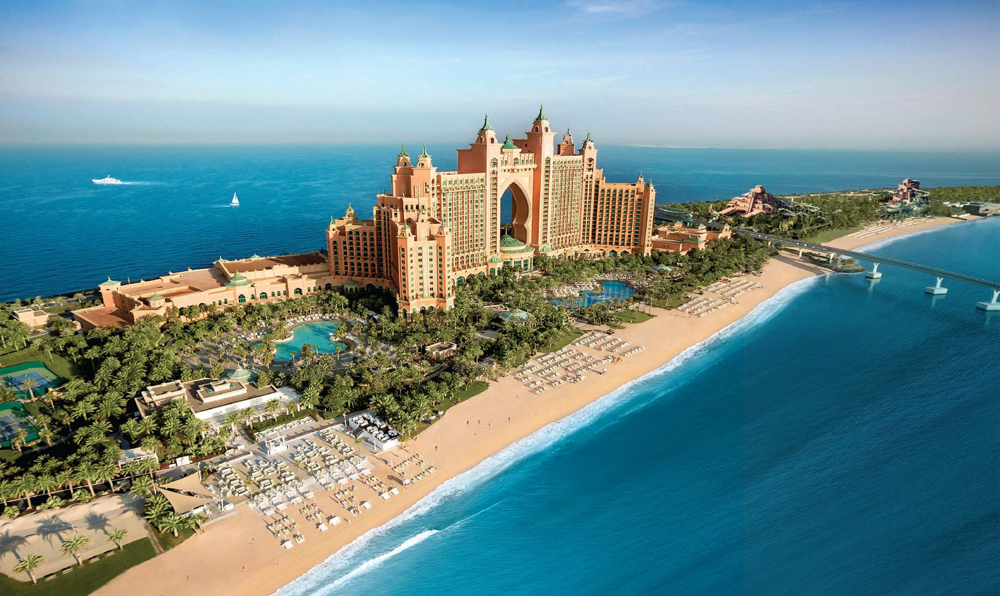Shattering Records & Stereotypes | Dubai’s Rich History
With a multicultural population that includes more than 200 nationalities, Dubai appeals to a culturally and geographically diverse demographic — both in real estate and tourism.
The record-breaking city is home to the world’s largest shopping malls, the largest indoor theme park and one of the largest man-made islands in the world, the Palm Jumeirah.
Admire the urban skyline from the Dubai Marina, the world’s largest manmade marina. Explore Dubai’s cultural hub, the Al Fahidi Historical Neighbourhood; go on guided mosque visits, tour the Dubai Museum, and discover art galleries. Later, take an abra ride across Dubai Creek to visit the souks (Arab markets).
“Much has been written about Dubai but what I feel, from my personal experience, is that Dubai is a city to be experienced in person — and best of all — on foot,” says Ahmad Juma Al Falasi, the executive director of group operations for Emaar Properties PJSC.
“You must walk through the cobbled pathways of its historic neighborhoods, discover the marvels offered in Downtown Dubai, along the Sheikh Mohammed bin Rashid Al Maktoum Boulevard, and watch the city’s glistening lights from a sunset ferry,” adds Al Falasi.
Travel 20 minutes outside of the city to embark on a Dubai-style safari in the Arabian Desert — complete with off-roading camel rides, barbeques and henna. Other noteworthy must-sees include The Dubai Frame, the Dubai Opera and Kite Beach. “Dubai is a destination like no other. It is both a solo-friendly traveler destination as much as it is family-friendly with plenty of activities for all age groups,” says Dounia Fadi, chief operating officer of Berkshire Hathaway HomeServices Gulf Properties. The city also offers world-class dining, high-end hotels and record-breaking infrastructure. Dubai is home to the tallest structure and building in the world, the Burj Khalifa. The 829.8-meter skyscraper, developed by Emaar Properties PJSC, has held the record since 2009.
“Burj Khalifa is not just about its height,” says Al Falasi, who believes the structure serves as a reference point in urban high-rise architecture.
“Pushing the boundaries of design, architecture, engineering and construction expertise, Burj Khalifa marks a world-first in every aspect,” adds Al Falasi. “Reflecting the cosmopolitan outlook of the city, Burj Khalifa is also a compelling example of a truly global collaboration that reflects the positivism that comes when people across the world work toward a common purpose.” More than 60 of the world’s leading consultants worked on the design, alongside thousands of professionals and skilled workers from 100-plus countries.
Burj Khalifa is an integral part of Emaar’s 500-acre mega-development, Downtown Dubai — which includes the Dubai Mall and the Dubai Foundation. The Dubai Foundation features the world’s largest choreographed fountain system, while the Dubai Mall is home to 1,200-plus shops, 150 restaurants, an ice rink, an indoor waterfall, and the Dubai Aquarium and Underwater Zoo.
“Burj Khalifa and Downtown Dubai have had a profound impact on Dubai’s real estate market,” says Al Falasi, who notes that international investor interest surged following Burj Khalifa’s grand inauguration in 2010.
With a focus on new technology, sustainability and growth, Dubai has become one of the most sought-after destinations for luxury property — with a growing demand from international investors. “We have a large number of investors from countries such as China, India, Saudi Arabia, the United States and several European nations,” according to Al Falasi.
“Dubai is a cosmopolitan city that was recently ranked the ninth most desirable expatriot destination in the world as it has stamped its authority as a preferred global destination to live and work in,” Fadi says.
Fadi believes that Dubai’s real estate appeals to a large demographic. “The vision of Dubai’s leadership has created a place where your soul and mind are nurtured irrespective of your age, gender, ethnicity or faith,” she says.
Some travelers and foreign buyers are under the impression that Dubai is unsafe — particularly for women, due to inaccurate stereotypes of the Middle East. “Dubai has a rich mix of cultures and is very open to the world. It is home to more than 200 different nationalities who are living in harmony and respect,” Fadi argues.
In fact, Fadi credits the culture in Dubai for her success in the real estate industry. “Working in a male-dominated industry is not easy, but because of the safe and secure social environment here in the UAE, I was able to go beyond what people think a young female could achieve,” she says.
As for what the future holds for Dubai, the city is set to host Expo 2020 — the third largest global event in terms of cultural and economic impact. The event is predicted to attract 25 million visitors, of which 70 percent will come from 192 different countries, according to Fadi. The expo is expected to create 300,000 jobs and to further boost the UAE economy by $33.4 billion.
With Expo 2020 Dubai, Al Falasi says, “We are confident of the luxury real estate sector gaining more traction as more visitors see for themselves the world-class lifestyle that Dubai has to offer.”
Source: http://bit.ly/2oISKyq
Full Berkshire Hathaway HomeServices Prestige Magazine



